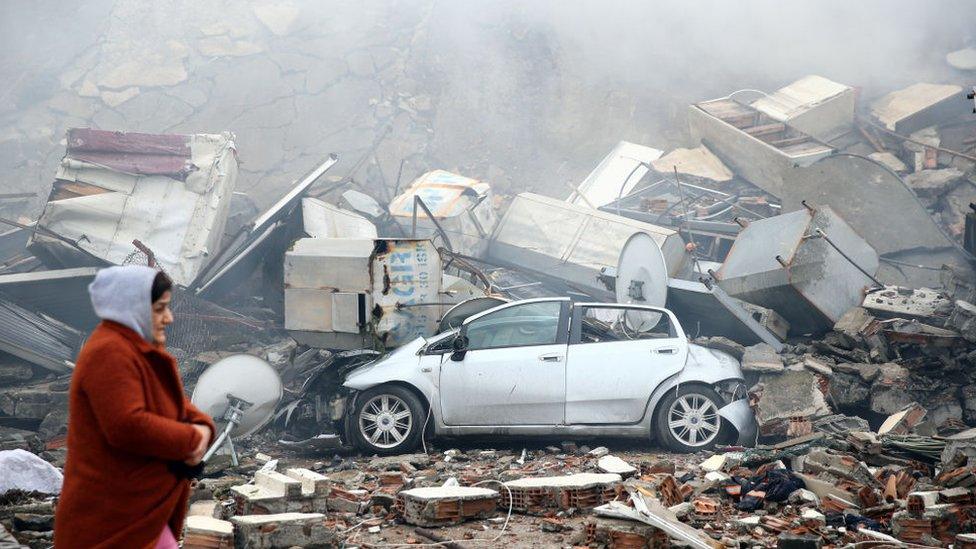Turkey earthquake: Anguished wait for Turkish and Syrian communities
- Published
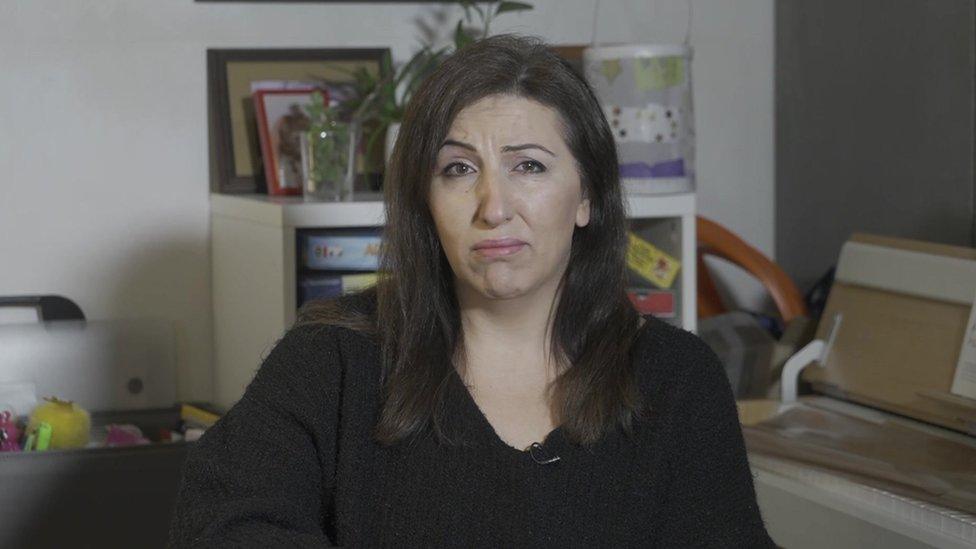
Kitle Eikelberg says government aid is yet to reach the village where her relatives live
A woman has told of her devastation after losing relatives following the earthquake in south-east Turkey.
Kitle Eikelberg is one of thousands among the UK's Turkish and Syrian communities in anguish as the quake's death toll rises above 5,000.
Ms Eikelberg told the BBC she was "broken" by the "loss and destruction" in her country.
British search and rescue specialists sent by the UK government are due to set to fly to Turkey today.
Ms Eikelberg, from Richmond, London, said she had been told six distant relatives had died in Maksutusagi - the southern Turkish village she grew up in - during the earthquake, but her two elderly aunts and uncles managed to survive.
"Distant relatives died, but none of my closer relatives - they managed to escape," she said. "All my close relatives are in the open or in their cars and no-one has come to the rescue in the villages.
"It is freezing temperatures, they have no power, no water, and their phone batteries are dying."
The mother of two described damaged houses - some collapsed - in the small village, which she visits every summer.
"People are scared to go in and out because of tremors and they are terrified to get near the houses," she said.
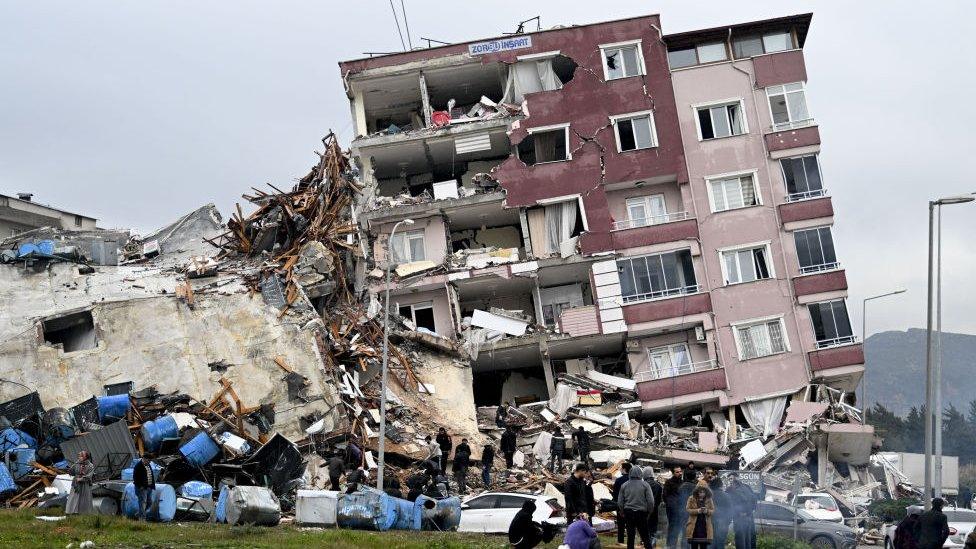
A collapsed building in Hatay in Turkey
Ms Eikelberg, who has lived in the UK for 20 years, explained government aid had not reached the village which urgently needs shelter and food. But she claimed efforts by families to help the village had been hampered by damaged roads and authorities.
She said: "People are outside in the snow and it is night time now. They need tents and generators
"They cannot wait. I can't do anything
"I am broken. It is a nightmare."
The earthquake has also had a profound effect on her daughter. "We tried to keep her away from it, but she hears it on the radio. She's been crying, worried. Will she ever go back?"
Cengiz Akarsu, from Country Durham in north east England, said his childhood friend remains missing following the quake and it would be a "miracle" if he was alive.
He said his friend lived in an area, seen in footage on the news, in which the "whole street collapsed".
"He's got two little kids," he told BBC Radio Newcastle. "I called his brothers - they're on the way but unfortunately the roads going into the city they've been damaged, and then the bridge has collapsed on the roads so they can not pass through.
"We don't want to believe he died, but when I've spoken to people who live in that area they say its more than a miracle if they come out of that.
"It is really really bad."
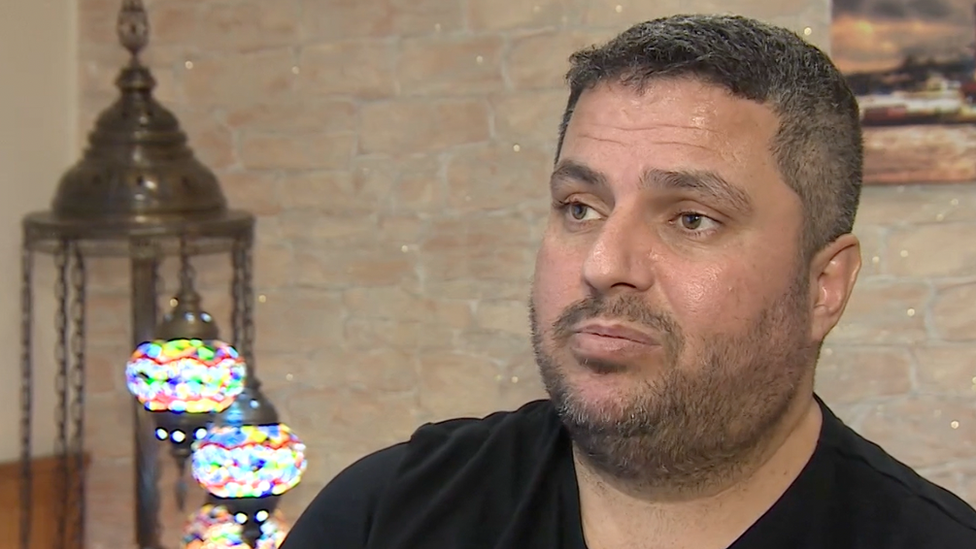
Cengiz Akarsu's brother has lost his house in the disaster
He said his brother had survived when a wall collapsed on him.
"My family was alright but one of my brothers... his house was damaged heavily and the wall collapsed on him.
"He managed to get out of it.
"We are all grateful my family is fine, but the sad thing is we just know there are a lot of people underneath collapsed buildings - one of them is my childhood friend."
The 7.8 magnitude quake struck near the Turkish town of Gaziantep in the early hours of Monday while people were asleep, before a 7.5 magnitude tremor hit later in the day.
Rescuers are now racing to save people trapped beneath the rubble after thousands of buildings collapsed in both countries.
Ali Topaloglu, from the Nottingham Turkish Community, told the BBC his family had been directly affected.
He said: "It's shocking. I can not find the words to describe the situation... it's devastating news. We lost some immediate family."
The chairman of the British Turkish Association said he had been "inundated" with calls from people worried about loved ones.
Attila Ustun described it as a "heartbreaking" day for Turks everywhere and said there was "a very large connection" between the Turkish communities in east and north London and the area where the quake struck.
He continued: "Some were born in those cities and towns that are now a disaster zone."
Mr Ustun said people from Turkish backgrounds had been reaching out after learning family members had died, including "one gentleman in Bedfordshire who has lost three of his uncles in one property".
He added: "I've been inundated, I had one lady in London crying her eyes out and saying that half of her village is now rubble.
"People are ringing me asking what they can do to help."
The British Turkish Association is taking donations, particularly winter clothes, at different points across the UK.
The UK government is sending a team of 76 search and rescue specialists to Turkey to help search for survivors. They are due to fly out later.
Foreign Secretary James Cleverly said the impact of the quakes was "on a scale that we have not seen for quite some time".
Development Minister Andrew Mitchell said the British team had been due to leave for Turkey on Monday night, but were delayed. On Tuesday morning he suggested they would leave "imminently", adding the first 72 hours were "critical".
The UK search and rescue teams have four search dogs, equipment including seismic listening devices, concrete cutting and breaking equipment, as well as a team of emergency medics to assess the situation on the ground.
No 10 said the government was looking at ways it could support humanitarian action in northwest Syria, and that its first approach would be to work through the United Nations (UN).
The Foreign Office also said in north-west Syria the White Helmets, humanitarian volunteers who received UK-funding, have mobilised their resources to respond.
David Wightwick, CEO of medical aid charity UK-Med, said he and his team were heading to Turkey on Tuesday morning to assess where their help is most needed, before mobilising their register of hundreds of NHS medics.
He told BBC Radio 4 Today programme: "It's that decision where it's most needed which is the bit that takes up the first day or so.
"You can imagine in an area the size affected and with the numbers affected that's not necessarily an easy decision to make."
Charities are also launching appeals, including The British Red Cross.
Its chief executive, Mike Adamson, said it was "shocking" to see the scale of destruction caused by this earthquake with homes, hospitals and roads destroyed across the region.
"The priority right now is rescuing people from the rubble and Red Cross Red Crescent teams are on the ground in Syria and Turkey providing urgent support during these critical hours."
Related topics
- Published6 February 2023
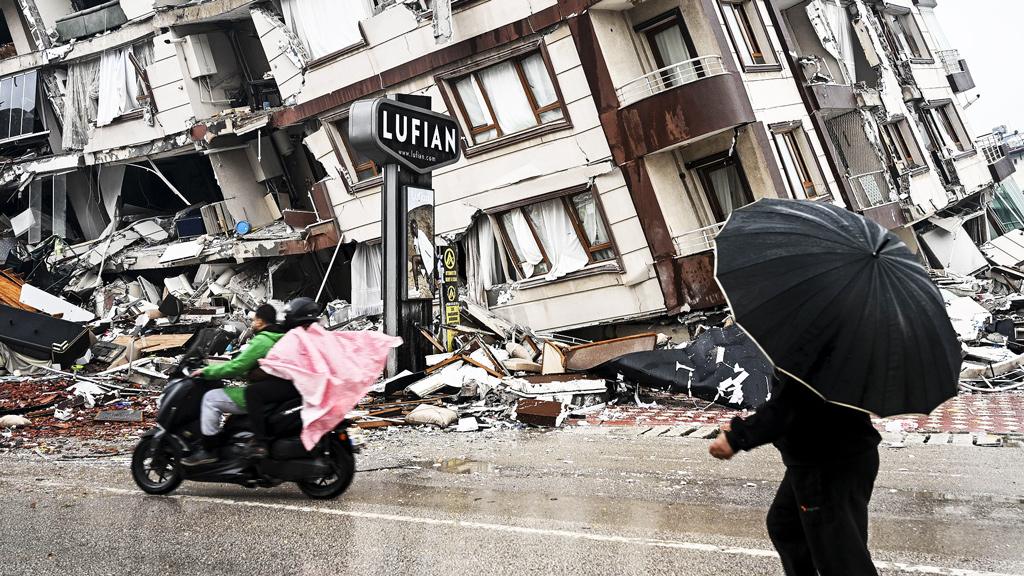
- Published10 February 2023
